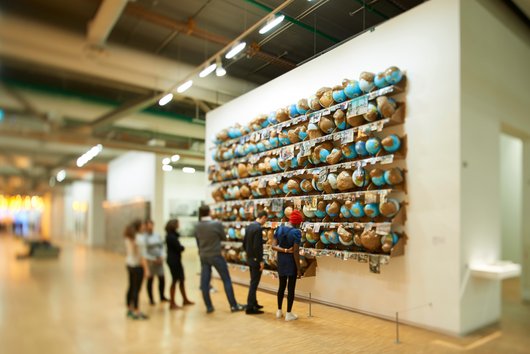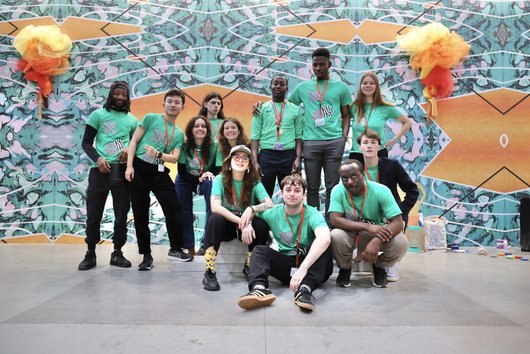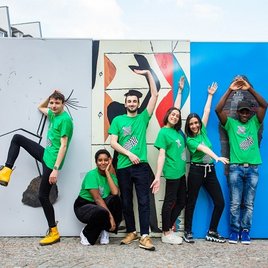Social mediators
Are you an employee or a voluntary worker in the social domain? Are you in contact with economically or socially vulnerable adults or children in situations of exclusion who are unfamiliar with cultural institutions?
Since it opened, the Centre Pompidou has endeavoured to enable a maximum number of people to access its collection, its programme and its visit and workshop offers.
We thus implement a deliberately inclusive policy designed to create and cultivate conditions to promote encounters and sharing around art works and creative practices. This commitment is based on the principle that each person is a cultural subject who has to right to education and information, the right to participate in cultural life and the right to free artistic expression. The Centre Pompidou thus situates its action in line with cultural rights that seek to increase the freedom, responsibility and capabilities of all.
The Centre Pompidou has been committed to the Living Together Mission since 2004, designing a variety of cultural offers combined with advantageous tariffs and customised support for professionals and voluntary workers in the social and medico-social fields.
Become a Centre Pompidou mediator

© Manuel Braun 2015
In order to avail of the right to speak as a guide, benefit from free group visits, and our training courses, you must first be registered as a social mediator with the Centre Pompidou.
Register online
Then participate in a "First Meeting" for new mediators in order to enable us to get to know each other better.
At this meeting you will be able to discover the diversity of the Centre Pompidou offers, and to exchange ideas on how to prepare and conduct your future group visits.
Consult the dates of the First Meetings
and enrol using the enrolment form provided in the calendar.
Once you have been registered as a mediator, you will receive a monthly newsletter keeping you abreast of the programme and appointments provided for mediators.
Advantages
Annual membership at reduced rates
If you wish to come to the Centre Pompidou frequently in order to prepare your visits or to discover the diversity of its programme, the Pop' Solo 1-year membership card (€27 instead of €49) provides unlimited access to Centre Pompidou spaces.
To avail of the special mediator rate:
- please contact the membership department by telephone at 01 44 78 14 63, Mondays to Saturdays, from 9 am to 6 pm
- or go to the on-site Membership space (Forum, level 0).
Exbibition "Niki de Saint Phalle, Jean Tinguely, Pontus Hulten"
From 20 June 2025 to 4 January 2026
Where: Grand Palais, Paris 8th
Galleries 3 and 4
Price: €30
Reservations:
At least 4 weeks in advance.
By telephone only: +44 (0)1 44 78 12 57, Monday to Friday (excluding public holidays), from 9.30am to 6pm.
Artistic digressions

Let yourself be surprised and guided differently by the members of the Art Session collective, young volunteers aged 18 to 25 who are actively involved in Centre Pompidou cultural projects. These young people use the "Artistic digressions" service to offer a customised discovery of the Centre Pompidou in a friendly manner based on dialogue, respect for all cultures, and participation.
The "Artistic digressions" prioritise a progressive and pro-active mode of discovery:
- 1st stage: a meeting with the volunteers in your structure;
- 2nd stage: a meeting with the volunteers in the Centre Pompidou and a favourites visit in small groups;
- 3rd stage: a creative workshop in the Centre Pompidou.
Target audience: young adults aged 18 to 25.
Contact us by email
1 day, 1 art work

"1 day, 1 art work" is an awareness-building programme for art and creation that is conducted outside the museum essentially for families, art-lovers and people with little knowledge of modern or contemporary art as exhibited in the Pompidou.
For one day, a major art work from the collection of the Centre Pompidou is presented free of charge to the public outside the museum context. It is presented by a curator from the Musée National d'Art Moderne, and leads to a hands-on artistic workshop for children and their parents.
In 2018, the "1 day, 1 art work" operation thus visited Robert Debré hospital (Paris, 19), the prison in the Hauts-de-Seine department, the emergency accommodation centre for migrants in Ivry-sur-Seine. In Ivry, the presentation of the work was translated in turn into Arabic, Dari, Pashto and English in order to enable a maximum number of people to engage in the exchange.


